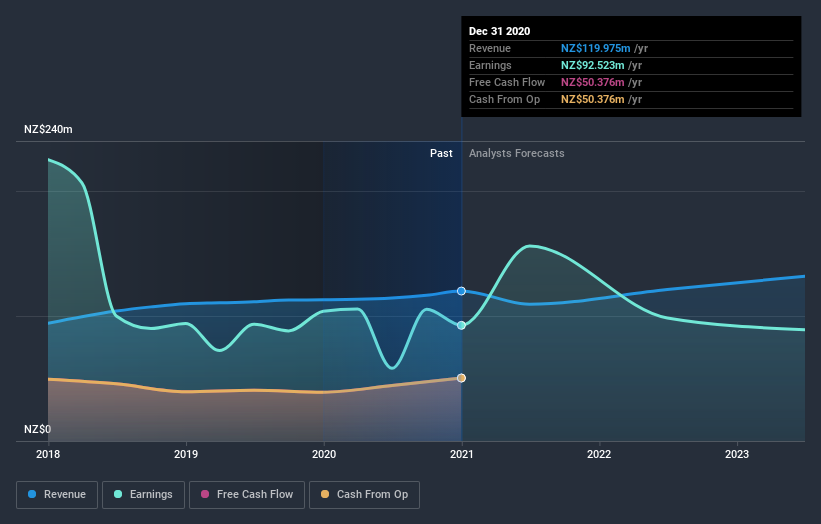- New Zealand
- /
- Health Care REITs
- /
- NZSE:VHP
How Many Vital Healthcare Property Trust (NZSE:VHP) Shares Do Institutions Own?

Every investor in Vital Healthcare Property Trust (NZSE:VHP) should be aware of the most powerful shareholder groups. Institutions often own shares in more established companies, while it's not unusual to see insiders own a fair bit of smaller companies. We also tend to see lower insider ownership in companies that were previously publicly owned.
Vital Healthcare Property Trust isn't enormous, but it's not particularly small either. It has a market capitalization of NZ$1.6b, which means it would generally expect to see some institutions on the share registry. In the chart below, we can see that institutions own shares in the company. Let's take a closer look to see what the different types of shareholders can tell us about Vital Healthcare Property Trust.
Check out our latest analysis for Vital Healthcare Property Trust

What Does The Institutional Ownership Tell Us About Vital Healthcare Property Trust?
Institutions typically measure themselves against a benchmark when reporting to their own investors, so they often become more enthusiastic about a stock once it's included in a major index. We would expect most companies to have some institutions on the register, especially if they are growing.
Vital Healthcare Property Trust already has institutions on the share registry. Indeed, they own a respectable stake in the company. This implies the analysts working for those institutions have looked at the stock and they like it. But just like anyone else, they could be wrong. If multiple institutions change their view on a stock at the same time, you could see the share price drop fast. It's therefore worth looking at Vital Healthcare Property Trust's earnings history below. Of course, the future is what really matters.

We note that hedge funds don't have a meaningful investment in Vital Healthcare Property Trust. Northwest Value Partners Inc. is currently the company's largest shareholder with 23% of shares outstanding. For context, the second largest shareholder holds about 9.1% of the shares outstanding, followed by an ownership of 5.0% by the third-largest shareholder.
A deeper look at our ownership data shows that the top 25 shareholders collectively hold less than half of the register, suggesting a large group of small holders where no single shareholder has a majority.
While it makes sense to study institutional ownership data for a company, it also makes sense to study analyst sentiments to know which way the wind is blowing. There are plenty of analysts covering the stock, so it might be worth seeing what they are forecasting, too.
Insider Ownership Of Vital Healthcare Property Trust
While the precise definition of an insider can be subjective, almost everyone considers board members to be insiders. The company management answer to the board and the latter should represent the interests of shareholders. Notably, sometimes top-level managers are on the board themselves.
I generally consider insider ownership to be a good thing. However, on some occasions it makes it more difficult for other shareholders to hold the board accountable for decisions.
We can see that insiders own shares in Vital Healthcare Property Trust. This is a big company, so it is good to see this level of alignment. Insiders own NZ$31m worth of shares (at current prices). If you would like to explore the question of insider alignment, you can click here to see if insiders have been buying or selling.
General Public Ownership
With a 49% ownership, the general public have some degree of sway over Vital Healthcare Property Trust. While this size of ownership may not be enough to sway a policy decision in their favour, they can still make a collective impact on company policies.
Next Steps:
I find it very interesting to look at who exactly owns a company. But to truly gain insight, we need to consider other information, too. For instance, we've identified 4 warning signs for Vital Healthcare Property Trust (2 can't be ignored) that you should be aware of.
If you are like me, you may want to think about whether this company will grow or shrink. Luckily, you can check this free report showing analyst forecasts for its future.
NB: Figures in this article are calculated using data from the last twelve months, which refer to the 12-month period ending on the last date of the month the financial statement is dated. This may not be consistent with full year annual report figures.
If you’re looking to trade Vital Healthcare Property Trust, open an account with the lowest-cost* platform trusted by professionals, Interactive Brokers. Their clients from over 200 countries and territories trade stocks, options, futures, forex, bonds and funds worldwide from a single integrated account. Promoted
New: Manage All Your Stock Portfolios in One Place
We've created the ultimate portfolio companion for stock investors, and it's free.
• Connect an unlimited number of Portfolios and see your total in one currency
• Be alerted to new Warning Signs or Risks via email or mobile
• Track the Fair Value of your stocks
This article by Simply Wall St is general in nature. It does not constitute a recommendation to buy or sell any stock, and does not take account of your objectives, or your financial situation. We aim to bring you long-term focused analysis driven by fundamental data. Note that our analysis may not factor in the latest price-sensitive company announcements or qualitative material. Simply Wall St has no position in any stocks mentioned.
*Interactive Brokers Rated Lowest Cost Broker by StockBrokers.com Annual Online Review 2020
Have feedback on this article? Concerned about the content? Get in touch with us directly. Alternatively, email editorial-team (at) simplywallst.com.
About NZSE:VHP
Vital Healthcare Property Trust
An NZX-listed fund that invests in high-quality healthcare properties in New Zealand and Australia including private hospitals (~81% of portfolio value), ambulatory care facilities (~17% of portfolio value) and aged care (~2% of portfolio value).
Average dividend payer with moderate growth potential.
Market Insights
Community Narratives



